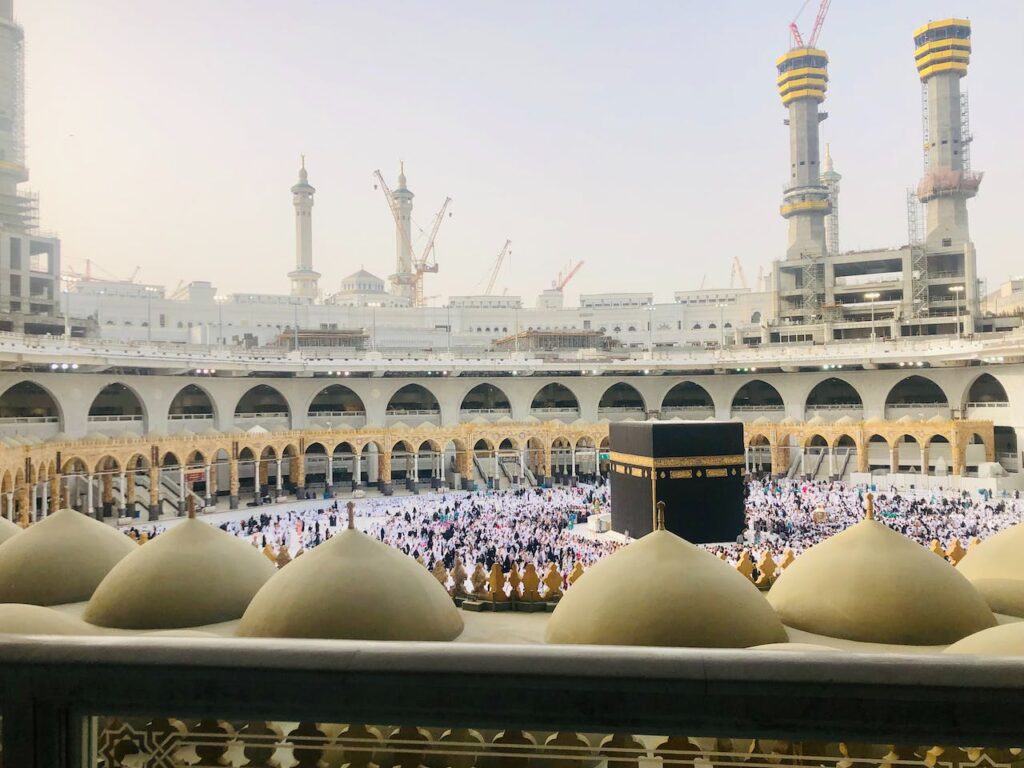In this guide, we’ll explore the differences between Hajj and Umrah, and shed light on the question of what comes first Hajj or Umrah? and delve into the benefits of performing these rituals.
In addition, we’ll provide you with valuable tips to ensure a smooth and fulfilling experience during your Hajj and Umrah journeys.
Embarking on Hajj and Umrah is a deeply personal and meaningful experience for Muslims around the world. It is an opportunity to connect with their faith, purify their souls, and seek spiritual enlightenment. So, let’s begin this journey together and uncover the wonders of Hajj and Umrah.
Hajj vs Umrah – What is the Difference?
While both Hajj and Umrah are important Islamic pilgrimages, there are several key differences between the two. Let’s explore the similarities and differences to gain a better understanding:
Firstly, Similarities
- Both Hajj and Umrah involve visiting the holy city of Mecca in Saudi Arabia.
- During both pilgrimages, pilgrims wear Ihram Clothing.
- Both Hajj and Umrah include the ritual of Tawaf, which involves circumambulating the Kaaba in the Grand Mosque.
- Both pilgrimages involve walking between the hills of Safa and Marwa, known as Sa’i.
- Both Hajj and Umrah provide a chance for Muslims to seek forgiveness, perform acts of worship, and strengthen their relationship with Allah.
Secondly, Differences
- Importance: Hajj is obligatory for every Muslim who has the means and physical ability to undertake it. while Umrah is a voluntary pilgrimage.
- Time: Hajj has specific dates and can only be performed during the month of Dhul Hijjah. whereas Umrah can be performed at any time of the year.
- Duration: Hajj is a longer pilgrimage, usually lasting five to six days, while Umrah can be completed within a few hours.
- Scale: Hajj involves a larger number of pilgrims from around the world, making it a more crowded and bustling pilgrimage. whereas Umrah is generally less crowded.
- Rituals: Hajj includes additional rituals such as standing in the plains of Arafat and spending the night in Mina. which are not part of the Umrah pilgrimage.
What Comes First – Hajj or Umrah?
Now, let’s address the question that often arises: which pilgrimage should be performed first, Hajj or Umrah?
According to Islamic teachings and scholarly opinions, there is no specific order in which Hajj and Umrah must be performed. Muslims have the freedom to choose whether they want to perform Hajj first or Umrah first.
However, it is worth noting that some scholars recommend performing Umrah before Hajj. The rationale behind this recommendation is that Umrah is considered a preparation or a warm-up for Hajj. Performing Umrah first allows pilgrims to familiarize themselves with the rituals, get accustomed to the environment of Mecca, and mentally and spiritually prepare for Hajj.
By performing Umrah before Hajj, pilgrims can benefit from the spiritual cleansing and reflection that Umrah offers, which can enhance their experience and devotion during Hajj.
Ultimately, the decision of whether to perform Hajj or Umrah first is a personal one, and it depends on individual circumstances and preferences. Some Muslims choose to perform Umrah separately and at a different time, while others combine Umrah with their Hajj pilgrimage.
It is important to consult with knowledgeable individuals or scholars who can provide guidance based on your specific situation and intentions.
When Should Hajj and Umrah Be Performed?
The timing of Hajj and Umrah depends on the lunar calendar and specific Islamic months. Here are the key considerations for when these pilgrimages should be performed:
Firstly, Hajj: Hajj is performed during the Islamic month of Dhul Hijjah, specifically from the 8th to the 13th of the month. These dates are fixed and do not change from year to year. It is important to note that Hajj is obligatory only once in a lifetime for those who have the means and physical ability to undertake it.
Secondly, Umrah: Unlike Hajj, Umrah can be performed at any time of the year. There are no specific dates or restrictions on when Umrah should be undertaken. Muslims have the flexibility to choose a time that suits them and their circumstances.
Many Muslims prefer to perform Umrah during the holy month of Ramadan due to the increased spiritual rewards and the blessed atmosphere in Mecca during this time. However, Umrah can be performed outside of Ramadan as well.
Benefits of Hajj and Umrah
Hajj and Umrah hold immense spiritual, physical, and social benefits for Muslims. These holy pilgrimages offer a unique opportunity to connect with one’s faith, seek forgiveness, and find inner peace. For example:
Spiritually
They offer a chance to reflect on one’s life, seek forgiveness for past sins, and strengthen one’s relationship with Allah. The rituals performed during these pilgrimages, such as circumambulating the Kaaba and standing in Arafat, instill a deep sense of devotion and humility.
Health
Embarking on Hajj and Umrah involves physical exertion and movement, which can have numerous health benefits. The rituals of walking between Safa and Marwa, standing in Arafat, and participating in the symbolic stoning of the devil in Mina require pilgrims to be physically active.
This physical activity has many health benefits, for example:
- Promotes cardiovascular health.
- Improves stamina.
- Increases overall fitness.
Economically
Hajj and Umrah have significant economic benefits for the local communities in Mecca and Medina. These holy cities rely heavily on the revenue generated from pilgrimages, including hotel accommodations, transportation services, food and beverage establishments, and retail businesses.
Socially
The Hajj and Umrah bring Muslims from different nations, cultures, and backgrounds together in a spirit of unity and brotherhood. The gatherings in Mecca create a unique environment of diversity, where people from all walks of life come together with a shared purpose.
This social aspect of Hajj and Umrah fosters understanding, compassion, and friendship among pilgrims. It allows individuals to connect with fellow Muslims from around the world, learn about different cultures, and build lifelong bonds.
Tips For Performing Hajj and Umrah
Pre-Hajj Preparation
- Research and familiarize yourself with the rituals and requirements of Hajj and Umrah. Understanding the significance and proper execution of each ritual will enhance your experience.
- Consult with knowledgeable individuals, scholars, or travel agencies who can provide guidance and answer any questions you may have.
- Obtain the necessary visas, passports, and travel documents well in advance. Ensure that your passport is valid for at least six months beyond your intended travel dates.
- Make necessary arrangements for accommodations, transportation, and meals. It is advisable to book your accommodations close to the Grand Mosque in Mecca for easier access to the sacred sites.
- Pack essential items such as comfortable clothing, appropriate footwear, personal toiletries, medication, and copies of important documents.
- Inform family members or close friends about your travel plans and provide them with emergency contact information.
- Take care of your physical health by maintaining a balanced diet, staying hydrated, and engaging in regular exercise.
During Hajj and Umrah
- Follow the instructions of your group leader or guide and cooperate with fellow pilgrims. It is important to maintain a spirit of unity, patience, and respect throughout the journey.
- Be mindful of your surroundings and prioritize personal safety. Avoid overcrowded areas and follow safety guidelines provided by the authorities.
- Allocate sufficient time for each ritual and perform them with sincerity and devotion. Take the opportunity to supplicate and seek forgiveness during these sacred moments.
- Take care of your health by staying hydrated, protecting yourself from the sun, and getting enough rest. Remember to take any necessary medications as prescribed.
- Be mindful of your behavior and etiquette. Show respect for the sacred sites, fellow pilgrims, and the local culture. Avoid littering and maintain cleanliness.
- Keep important belongings such as passports, money, and valuables secure at all times. It is recommended to carry a small bag or pouch to keep these items close to you.
- Stay connected with your group or travel agency for any updates or changes in the schedule. Communication is key to ensuring a smooth and organized pilgrimage.
Post-Hajj and Umrah Considerations
- Reflect on your journey and the lessons learned during Hajj and Umrah. Use this experience as a catalyst for personal growth and positive change in your life.
- Share your experiences with family, friends, and the wider community. Spread knowledge and inspire others to embark on their own spiritual journeys.
- Continue to uphold the values and teachings of Hajj and Umrah in your everyday life. Let the spiritual lessons and insights gained during the pilgrimage guide your actions and decisions.
- Maintain a connection with the sacred sites and the memories of your pilgrimage. Engage in acts of worship and supplication even after returning home.
- Consider performing voluntary acts of worship, such as fasting, giving charity, and engaging in regular prayers. These acts will help sustain the spiritual momentum gained during Hajj and Umrah.
By following these tips, you can ensure a smooth, organized, and spiritually fulfilling experience during your Hajj and Umrah journeys. Remember to approach these pilgrimages with a sincere heart, seeking closeness to Allah and embracing the transformative power of these sacred rituals.
Key Takeaways
- Hajj is an obligatory pilgrimage for Muslims, while Umrah is a voluntary pilgrimage.
- There is no specific order in which Hajj and Umrah must be performed. Muslims have the freedom to choose whether to perform Hajj or Umrah first.
- Hajj is performed during the Islamic month of Dhul Hijjah, while Umrah can be performed at any time of the year.
- Hajj involves a larger number of pilgrims and additional rituals compared to Umrah.
- Both Hajj and Umrah offer immense spiritual, physical, and social benefits for Muslims.
- Preparation and planning are crucial for a smooth and fulfilling Hajj and Umrah experience.
- During the pilgrimage, it is important to prioritize safety, follow instructions, and maintain a spirit of unity and respect.
- Post-Hajj considerations include reflection, sharing experiences, and incorporating the lessons learned into everyday life.
In Conclusion,
In conclusion, Hajj or Umrah are significant pilgrimages in Islam that hold immense spiritual, physical, and social benefits for Muslims. While Hajj is obligatory and has specific dates, Umrah is voluntary and can be performed at any time of the year.
Throughout this comprehensive guide, we have explored the differences between Hajj and Umrah, shed light on the question of which one comes first, and delved into the benefits of performing these rituals. We have also provided valuable tips to ensure a smooth and fulfilling experience during your Hajj and Umrah journeys.
If you have any further questions or need additional guidance, we encourage you to consult with knowledgeable individuals or scholars who can provide personalized advice based on your specific circumstances.
Thank you for joining us on this enlightening journey, and may your Hajj and Umrah experiences be filled with peace, blessings, and divine mercy.
Discover the differences between Hajj and Umrah, as well as when Hajj and Umrah should be performed, and the benefits of each pilgrimage. Tips for performing hajj and umrah, and more!






